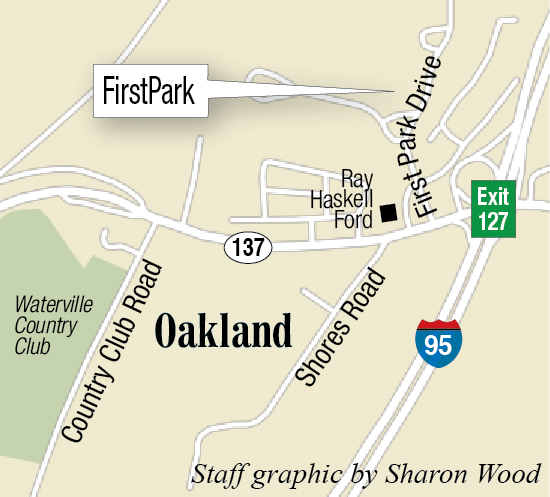OAKLAND — A visit to Oakland reaffirmed what U.S. Rep. Jared Golden said were already “appropriate priorities” for him in Washington: rural broadband access and bettering the economic climate for small businesses.
The first-term 2nd District congressman was in town for a “listening tour” Friday afternoon, which included stops in Mount Vernon, Oakland and Gardiner. While in Oakland, Golden met with representatives from three local business entities — Wrabacon, FirstPark and Maine Technology Group — and a handful of area officials. In Gardiner, he visited Johnson Hall Performing Arts Center.
Robert Bartlett, Wrabacon’s president, noted how difficult it is for him to find and keep adequate workers in Maine.
“It never was (a problem), but it really is — it’s tough to hire,” he told Golden during a tour of his Oakland-based company, which manufactures automated equipment. “We’ve actually had to raise our starting pay for no experience from around $15 an hour (to) $18, and we’re still not really getting — you really have to steal somebody if you want someone that’s pretty good.”
One in 5 prospective employees Bartlett encounters is “good,” which he said meant that they regularly showed up to work on time and were able to complete basic tasks. The company now employs 30 people who design automated processes for anything from packaging HIV tests to topping off filled iced tea bottles with a dose of cannabidiol, or CBD.
“Unfortunately, that’s our biggest drawback to expanding, so we’re looking at making a pretty big investment in some automated equipment to eliminate some manual (labor),” Bartlett said.

U.S. Rep. Jared Golden, D-2nd District, is greeted by local business owners Friday at FirstPark during a listening tour in Oakland. Golden was tapped to be on the rural broadband task force last month and talked about getting reliable WiFi to rural areas. Oakland recently received a $15,000 rural broadband grant to evaluate its infrastructure and prepare to expand internet access for businesses on Main Street. Morning Sentinel photo by Michael G. Seamans
Golden said that while he acknowledges the state’s labor shortage, he thinks “there is a limit to what you can legislate” in terms of getting a younger workforce to stay in Maine.
“Issues like that are really hard to fix with a bill or a law,” he said. “There’s so much involved, and what I’m finding is a lot of communities that are being successful are starting to understand that investments in rural downtown, I think, are really important. I think that my generation and the generation behind really want to live in rural but condensed — walkable, bikeable, livable — (areas) and (want) entertainment readily available. But we want our cake and we want to eat it too. We love being out in nature and to get out of the city but also have some of the city. Broadband is part of that discussion too, as is quality education and the availability of it. Those are all parts of the question of: How do we get people here and keep them?”
Garvan Donegan, senior economic development specialist for the Central Maine Growth Council, said Golden’s response echoed the results of a communitywide survey in Oakland that is informing the development of the town’s comprehensive plan. Residents voiced strong approval for a thriving downtown.
Golden, who was appointed to the House Task Force on Rural Broadband in May, said a focus of his work in Congress is trying to eliminate the barriers non-urban towns face in getting functional internet service. He is working on a bill to help small businesses in rural areas connect with the “last mile” of broadband, which Communications Director Nick Zeller said will be introduced in “the next few months.”
“The government probably doesn’t need to and shouldn’t — or the taxpayer — pay for everything, but every now and then you come across something that’s just unlikely to have the private sector finish the job because there’s just not enough profit or certainty, and that’s (what) we’re kind of talking about (with) broadband,” Golden said, comparing the issue to rural electrification.

U.S. Rep. Jared Golden, D-2nd District, far left, listens Friday to Garvan Donegan, director of planning and economic development for Central Maine Growth Council, far right, as local business owners take part in Golden’s “listening tour” at FirstPark in Oakland. Morning Sentinel photo by Michael G. Seamans
He said eligibility requirements for federal broadband expansion grants from the U.S. Department of Agriculture and other agencies are in need of an overhaul. The USDA relies on the Federal Communications Commission to establish eligibility.
“The FCC does all this mapping, but they don’t actually go out from town to town to town all over America and verify who has broadband,” Golden said. “They call the internet service providers, and the internet service providers have a lot of different interests in how they answer those questions about, ‘Is broadband available in the area that you’re providing it?'”
Internet service providers, he said, purchase “blocks of bandwidth, for a lack of better word,” and can sell it to smaller providers, but “have in many cases a little mini-monopoly.”
“The FCC will draw this big map, let’s say around Waterville, as an example, and (an ISP) will purchase the rights to that and then they’ll only provide service in Waterville and nowhere else around it,” he described. “Then the FCC maps that entire area as having broadband access when really it’s only downtown Waterville that has it. So then let’s say Rome decides that they want (broadband) and they apply for a grant, but then get told, ‘Well, you have broadband; you’re not eligible.’ So we’re trying to tweak how eligibility is determined to make sure that people aren’t getting left out because of the interest of internet service providers who don’t want competition.”
Oakland, a town of roughly 6,200 people, recently received a $15,000 grant from the Maine Community Foundation to map the town’s existing broadband infrastructure and evaluate the costs of investing in a capital project to improve internet access along Main Street. China recently submitted a $1.1 million broadband grant proposal to the USDA. Donegan said the area is “ripe for federal funding.” FirstPark, which hosted the beginning of Golden’s Oakland tour, has attempted to lure businesses to its campus off Kennedy Memorial Drive with fiber optic high-speed internet technology since 2004.
Along with hearing familiar concerns Friday, Golden said his trip to Oakland also contributed to “stretching my imagination in terms of what’s possible in Maine.”

U.S. Rep. Jared Golden, D-2nd District, speaks with local business owners Friday at FirstPark in Oakland on Friday. Golden was tapped to be on the rural broadband task force last month and talked about getting reliable WiFi to rural areas. Oakland recently received a $15,000 rural broadband grant to evaluate its infrastructure and prepare to expand internet access for businesses on Main Street. Morning Sentinel photo by Michael G. Seamans
Specifically, Sean Conerly, business development manager for Maine Technology Group, helped show that Maine is growing its potential in the area of IT and cyber-security services for small to mid-sized businesses.
“We’re finding that cyber-security is a high-priority issue for small to mid-sized businesses,” Conerly told the congressman. “We’re finding that a lot of small to mid-sized business are under attack from hackers from all around the world, and they continue to evolve, they continue to get better, and frankly it’s not really just businesses; it’s entities. I’m sure you’re all familiar with the breach that happened at the city of Augusta.”
Golden recalled a hearing in the small-business committee when a representative from a misleadingly named limited liability corporation that he later found out was “owned by some of the bigger tech companies in Silicon Valley” told congressmen that the best way to help the IT and cyber-security services industry was to “just stay out of the way.”
“My interpretation of that was: ‘We see an opportunity to make money here, and we don’t really want you getting in the way,'” Golden said. “I may have been wrong, but I think this is really important stuff for Maine, and to have someone who sees an opportunity to make money but also provide a real service to small businesses is great.”
Golden said he had heard investors were looking to “start a college in Portland specifically to train people in cyber-security and the IT space, and they’re (very) close to opening up their doors.
“It could be a pipeline (to the Maine Technology Group), so to speak, if they’re successful,” Golden added.
“I’m excited to hear what you’re doing,” he told Conerly. “I’m not going to lie. When I hear people talk about trying to bring tech to Maine, I’ve kind of held back a little bit. So to actually see some people stepping into that space — I’ll be more active.”
Golden said these are the types of encounters that keep him going on “listening tours” of Maine’s 2nd Congressional District.
“I think the job is one that needs to be focused on constantly learning about the community and what people are doing,” the freshman representative said. “How else are you supposed to have a gut instinct for how to best represent them? I’m not in control of the legislative calendar. I use these types of meetings and days like this to help develop our own priority-setting and also just to keep my finger on the pulse and have a better sense of how the issues that are being talked about and voted on in Washington interact with what’s going on in Maine.”
Send questions/comments to the editors.




Comments are no longer available on this story